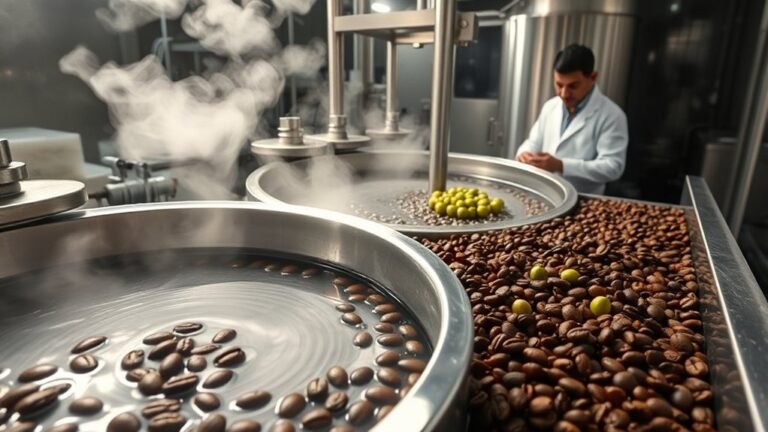Coffee and Acid Reflux: Can Coffee Make It Worse?
If you have acid reflux, coffee can make symptoms worse by increasing stomach acid and relaxing the lower esophageal sphincter, allowing acid to flow back into your esophagus. Its acidity and caffeine content vary by roast and brewing method, which influences your individual tolerance. Choosing low-acid or decaffeinated options may help reduce discomfort. Understanding how different coffees affect your digestive system and learning helpful management strategies can provide clearer guidance for your situation.
Understanding Acid Reflux and Its Causes

Although acid reflux is a common condition, you might not fully understand what causes it. Acid reflux occurs when stomach acid flows back into the esophagus, irritating its lining and producing reflux symptoms such as heartburn, regurgitation, and chest discomfort. This backflow happens when the lower esophageal sphincter (LES), a muscular valve, weakens or relaxes inappropriately. Various dietary triggers can exacerbate reflux symptoms, including fatty foods, spicy dishes, and certain beverages. Identifying and managing these triggers is essential for controlling acid reflux and maintaining your freedom from discomfort. Understanding these physiological mechanisms empowers you to make informed choices about your diet and lifestyle, enabling effective management of reflux symptoms and enhancing your overall quality of life.
How Coffee Affects the Digestive System
When you consume coffee, its compounds interact directly with your digestive system, influencing various physiological processes. Coffee digestion begins in the stomach, where caffeine and other active substances stimulate gastric acid secretion. This can accelerate digestion but may also affect the lower esophageal sphincter’s function. Caffeine effects include increased gut motility and mild laxative action, which can alter digestive comfort.
Key impacts of coffee digestion on your system include:
- Enhanced gastric acid production
- Stimulation of digestive enzymes
- Increased intestinal motility
- Potential relaxation of the lower esophageal sphincter
- Modulation of gut hormone release
Understanding these mechanisms helps you gauge how coffee might influence your digestive health and acid reflux symptoms.
The Role of Acidity in Coffee and GERD Symptoms
You should understand that coffee’s pH level contributes to its acidity, which may trigger GERD symptoms in sensitive individuals. Identifying how acidic coffee affects your reflux can help you manage discomfort effectively. Adjusting your coffee intake or choosing low-acid options might reduce acid-related irritation.
Coffee’s Ph Impact
The acidity level of coffee, measured by its pH, plays a significant role in how it affects acid reflux symptoms. Coffee acidity varies, typically ranging between pH 4.5 and 6.0, indicating mild to moderate acidity. Lower pH levels mean higher acidity, which can potentially irritate your esophagus and worsen reflux. Understanding coffee’s pH impact helps you choose varieties that might minimize discomfort.
Consider these factors about coffee acidity and pH levels:
- Dark roasts usually have lower acidity compared to light roasts.
- Cold brew coffee tends to have a higher pH, therefore less acidic.
- Brewing methods influence overall acidity.
- Acidic coffee can stimulate gastric acid production.
- Individual sensitivity to acidity varies widely.
Acid Reflux Triggers
Understanding how coffee’s acidity influences acid reflux symptoms leads to examining specific triggers within coffee that exacerbate GERD. Coffee contains organic acids like chlorogenic and citric acid, which can irritate the esophageal lining and relax the lower esophageal sphincter, allowing stomach acid to reflux. For many, these acids act as trigger foods, worsening symptoms such as heartburn and regurgitation. Your dietary habits also play an essential role; combining coffee with high-fat or spicy foods may amplify reflux episodes. Recognizing coffee’s acidic components as potential triggers helps you identify patterns in symptom occurrence. By pinpointing these factors, you can make informed choices about your coffee intake and overall diet, maintaining your freedom to enjoy beverages without compromising gastrointestinal comfort.
Managing GERD Acidity
Although coffee’s acidity can aggravate GERD symptoms, managing its impact involves strategic choices in preparation and consumption. You can reduce discomfort by paying attention to dietary adjustments and symptom tracking, which help identify your personal tolerance levels. Opt for low-acid coffee varieties or cold brew methods, as these typically have reduced acidity. Avoid adding acidic additives like citrus or creamers that may increase reflux risk. Maintaining portion control and avoiding coffee on an empty stomach can also mitigate symptoms. Consistent symptom tracking enables you to make informed decisions about your coffee habits and overall diet.
- Choose low-acid coffee blends
- Use cold brew or dark roast methods
- Limit coffee intake and avoid empty stomach consumption
- Avoid acidic additives
- Keep a detailed symptom diary for personalized adjustments
Scientific Studies on Coffee and Acid Reflux

Since you’re likely aware of coffee’s popularity, it’s important to examine how scientific studies have evaluated its impact on acid reflux. Coffee studies consistently investigate its role in lowering the pressure of the lower esophageal sphincter, a key factor in reflux. Reflux research shows that coffee can increase gastric acid secretion, potentially aggravating symptoms in sensitive individuals. However, results vary; some studies indicate no direct correlation between moderate coffee consumption and increased reflux episodes. This suggests individual response differences, influenced by factors such as coffee type, brewing method, and personal sensitivity. While reflux research highlights potential risks, it also underscores the need for personalized approaches. Understanding these findings helps you make informed choices about coffee intake relative to acid reflux management and your lifestyle preferences.
Types of Coffee and Their Impact on Acid Reflux
When considering acid reflux, the type of coffee you choose can considerably influence your symptoms. Different espresso types and coffee blends vary in acidity and caffeine content, directly impacting reflux severity. Darker roasts often have lower acidity, potentially reducing discomfort, while lighter roasts might exacerbate symptoms. Additionally, single-origin blends may differ from mixed blends in their acid profile.
- Dark roast coffee usually has less acid than light roast.
- Espresso types vary in concentration, influencing acid reflux risk.
- Blends combining Arabica and Robusta beans affect acidity levels.
- Cold brew coffee tends to be less acidic than hot brewed.
- Decaffeinated options may reduce reflux symptoms by lowering caffeine intake.
Choosing the right coffee type lets you enjoy freedom without worsening acid reflux.
Tips for Drinking Coffee With Acid Reflux
Understanding the types of coffee that impact acid reflux is only part of managing your symptoms effectively. To minimize reflux symptoms during coffee consumption, start by limiting your intake to small amounts and avoid drinking coffee on an empty stomach. Opt for brewing methods that reduce acidity, such as cold brew or French press. Avoid adding high-fat creamers or sugary syrups, which can exacerbate symptoms. Pay attention to the timing of your coffee consumption; drinking it earlier in the day may help prevent nighttime reflux. Additionally, stay upright for at least 30 minutes after drinking coffee to reduce acid backflow. Monitoring your personal tolerance and adjusting your coffee habits accordingly empowers you to enjoy coffee while managing reflux symptoms responsibly.
Alternatives to Regular Coffee for Sensitive Stomachs

If you have a sensitive stomach, choosing low-acid coffee can reduce irritation and acid reflux symptoms. You might also consider herbal coffee substitutes, which are caffeine-free and gentler on the digestive system. Additionally, cold brew coffee tends to have lower acidity levels, making it a viable alternative for those prone to reflux.
Low-Acid Coffee Options
Although regular coffee is a common trigger for acid reflux, you can reduce discomfort by choosing low-acid coffee options specifically designed for sensitive stomachs. Selecting low acid brands is essential, as these are cultivated and processed to naturally contain fewer acids. Additionally, certain brewing methods can lower acidity, allowing you to enjoy coffee without aggravating reflux symptoms.
Consider these strategies:
- Opt for beans labeled “low acid” or grown at lower altitudes
- Use cold brew methods, which produce less acidic coffee
- Try dark roasts, as roasting reduces acid content
- Avoid espresso and drip methods that increase acidity
- Experiment with adding alkaline additives like calcium carbonate
Herbal Coffee Substitutes
When your stomach can’t tolerate traditional coffee, herbal coffee substitutes offer a practical alternative that minimizes acid reflux risks. These caffeine alternatives, often composed of herbal blends, are designed to mimic the flavor and aroma of coffee without the acidity and stimulants that trigger reflux. Ingredients like chicory root, dandelion, and barley are common in these blends, providing a robust taste with gentler effects on your digestive system. Using herbal coffee substitutes allows you to enjoy a warm, satisfying beverage while reducing the likelihood of acid irritation. For those seeking freedom from the discomfort linked to regular coffee, these alternatives present a scientifically sound option, supporting digestive health without sacrificing your daily ritual.
Cold Brew Benefits
Herbal coffee substitutes offer a viable option for reducing acid reflux, but cold brew coffee presents another approach for those sensitive to traditional brews. Cold brew is made by steeping coffee grounds in cold water for an extended period, resulting in a smoother, less acidic beverage. This preparation method reduces the acid content, making it easier on your stomach and potentially minimizing reflux symptoms. The health benefits of cold brew include lower acidity and a gentler impact on your digestive system compared to hot brewed coffee. If you’re exploring alternatives, consider these points about cold brew:
- Lower acid level reduces irritation risk
- Smoother taste with less bitterness
- Retains antioxidants beneficial for health
- Can be diluted to reduce caffeine concentration
- Suitable for those seeking freedom from acid reflux discomfort
Cold brew offers a balanced choice for sensitive stomachs.
Lifestyle Changes to Manage Acid Reflux Symptoms
Since acid reflux symptoms can greatly impact your daily comfort, adopting specific lifestyle changes is essential for effective management. You should focus on dietary modifications by avoiding foods and beverages that trigger reflux, such as high-fat meals, spicy dishes, and excessive coffee intake. Eating smaller, more frequent meals can reduce stomach pressure and prevent acid backflow. Additionally, stress management plays a significant role; chronic stress can increase acid production and worsen symptoms. Incorporate relaxation techniques like deep breathing, meditation, or regular exercise to help control stress levels. Elevating the head of your bed and avoiding lying down immediately after eating can also minimize reflux episodes. By implementing these targeted lifestyle adjustments, you gain control over your symptoms and maintain the freedom to enjoy daily activities with less discomfort.
Frequently Asked Questions
Can Decaffeinated Coffee Still Trigger Acid Reflux Symptoms?
Did you know that nearly 20% of acid reflux sufferers report symptoms after drinking decaf coffee? If you experience decaf sensitivity, it’s likely due to certain acids and compounds still present, not just caffeine. While decaffeinated coffee might reduce caffeine-related triggers, it can still aggravate your reflux. Exploring caffeine alternatives like herbal teas or chicory coffee might help you enjoy beverages without risking discomfort, giving you greater freedom from symptoms.
Does the Time of Day Affect Coffee’s Impact on Acid Reflux?
You might find that morning acidity is more pronounced after coffee due to overnight acid buildup, making your reflux symptoms worse. However, drinking coffee later in the day can sometimes offer evening relief by stimulating digestion and reducing acid levels before bedtime. Timing your coffee intake strategically could help you manage acid reflux better, allowing you to enjoy your coffee without compromising your comfort or freedom from symptoms.
Are Coffee Additives Like Cream or Sugar Linked to Acid Reflux?
You should know that cream effects on acid reflux vary; high-fat cream can relax your lower esophageal sphincter, potentially worsening reflux. Sugar impact is less direct but can contribute to overall digestive discomfort by promoting acid production. If you’re aiming to minimize reflux symptoms, consider limiting high-fat cream and excessive sugar in your coffee. Monitoring your body’s response helps you enjoy coffee while maintaining digestive freedom.
Can Cold Brew Coffee Cause Less Acid Reflux Than Hot Coffee?
You might find that cold brew benefits your digestion compared to hot coffee, as its brewing methods produce less acidity. Cold brew extracts coffee flavors slowly using cold water, resulting in a smoother, less acidic beverage. This reduced acidity can lessen acid reflux symptoms for some people. However, individual responses vary, so you should monitor how your body reacts to different brewing methods to enjoy coffee without discomfort.
Is There a Connection Between Coffee Consumption and Acid Reflux Medication Effectiveness?
Ever wonder if what you drink affects how well your medication works? When you consume coffee, your body’s coffee metabolism can influence medication absorption, potentially altering acid reflux treatment effectiveness. Caffeine may speed up gastrointestinal activity, which might reduce how long your medicine stays in your system. So, if you want your medication to work effectively, it’s essential to think about how your coffee habits might impact its absorption and overall efficacy.






